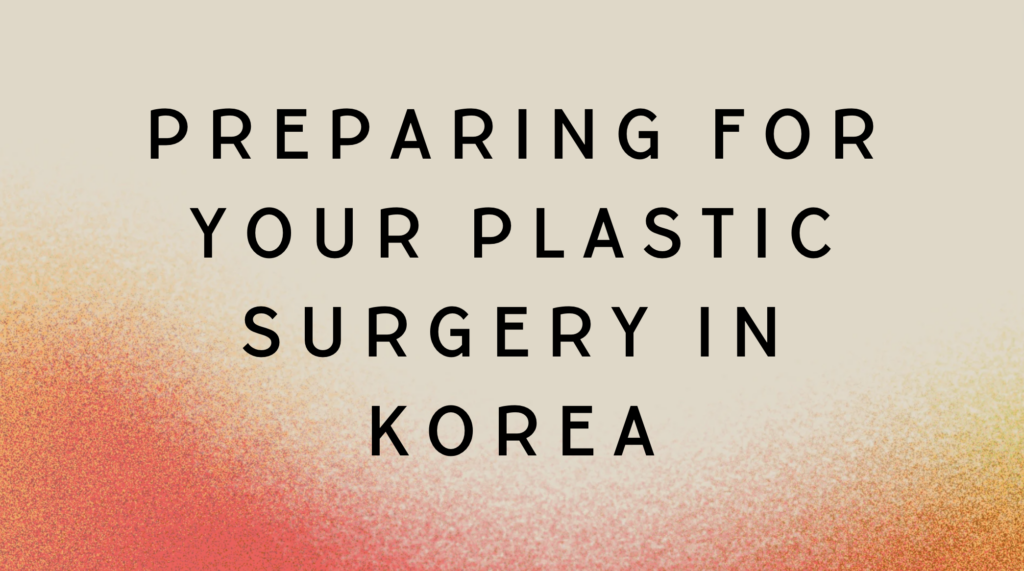Preparing for Your Plastic Surgery in Korea: What You Need to Know


Pre-Surgery Preparation: Tips and Guidelines
Preparing for plastic surgery in Korea is a significant step, especially for international patients. Proper preparation ensures that you are fully informed, mentally ready, and physically prepared for the procedure. Here’s what you need to know:
1. Research Your Surgeon and Clinic
- Verify Credentials: Ensure that your chosen surgeon is a board-certified plastic surgeon in Korea. Check their qualifications, including their training, experience, and the frequency with which they perform the procedure you are considering.
- Clinic Reputation: Look for clinics that specialize in the procedure you want and have a good reputation among international patients. Read reviews and testimonials, and ask for before-and-after photos of previous patients.
2. Understand the Costs
- Consultation Fees: Determine whether there are any fees associated with the initial consultation and whether these fees will be applied to the total cost of the surgery.
- Surgery Costs: Ask for a detailed breakdown of the total surgery costs, including the procedure itself, anesthesia, operating room fees, and any additional costs like post-operative care or medications.
- Post-Surgery Expenses: Understand any additional costs you might incur after the surgery, such as follow-up appointments, medications, or special care items.
3. Prepare Mentally and Physically
- Set Realistic Expectations: Have a clear understanding of what the surgery can and cannot achieve. Discuss your goals with your surgeon and make sure you both agree on the expected outcomes.
- Medical Evaluation: Depending on the surgery, you may need to undergo a medical evaluation to ensure you are fit for the procedure. This could include blood tests, imaging, or a general health check-up.
- Lifestyle Adjustments: In the weeks leading up to your surgery, follow any lifestyle adjustments recommended by your surgeon. This might include stopping smoking, avoiding certain medications, and maintaining a healthy diet.
What to Expect During Your Consultation
The consultation is a critical part of your plastic surgery journey. It’s an opportunity for you to meet your surgeon, discuss your goals, and ask questions. Here’s what you should expect:
1. Detailed Discussion of Your Goals
- Express Your Desires: Clearly explain what you want to achieve with the surgery. Be as specific as possible about your goals, and feel free to bring in reference photos if it helps convey your expectations.
- Expert Advice: Your surgeon will provide professional advice on whether your goals are realistic and what can be achieved through surgery. They may suggest alternative procedures or techniques if they believe it will yield better results.
2. Assessment and Recommendations
- Physical Examination: Expect a thorough examination of the area you want to enhance. The surgeon will assess your anatomy to determine the best approach for your surgery.
- Personalized Plan: Based on the assessment, the surgeon will outline a personalized surgical plan. This will include the recommended technique, expected results, and the recovery process.
3. Understanding the Risks and Benefits
- Informed Consent: The surgeon will explain the potential risks associated with the procedure, as well as the benefits. Make sure you understand all the possible outcomes, including any complications that could arise.
- Review Before-and-After Photos: Ask to see before-and-after photos of similar procedures the surgeon has performed. This can give you a realistic idea of what to expect.
4. Logistics and Planning
- Scheduling the Surgery: Discuss potential dates for your surgery and the time frame for your stay in Korea. Ensure that you have ample time for both the procedure and recovery.
- Financial Planning: Review the cost estimate provided and discuss payment options, including whether a deposit is required to secure your surgery date.
Understanding the Recovery Process
Recovery is an essential phase of your plastic surgery journey. Understanding what to expect can help you plan accordingly and ensure a smooth recovery:
1. Immediate Post-Surgery Care
- Initial Recovery Period: Most surgeries require a short stay at the clinic or hospital immediately after the procedure. During this time, you will be monitored closely to ensure there are no complications.
- Pain Management: Your surgeon will prescribe pain medication to help manage any discomfort during the initial recovery period. Be sure to follow the dosage instructions carefully.
2. Physical Activity and Rest
- Rest is Crucial: After surgery, you will need to rest to allow your body to heal. Avoid strenuous activities, heavy lifting, or anything that could strain the surgical area.
- Gradual Return to Normal Activities: Your surgeon will provide guidelines on when you can gradually resume normal activities, including work, exercise, and socializing.
3. Monitoring and Follow-Up
- Swelling and Bruising: Expect some swelling and bruising, which is normal after surgery. Your surgeon will provide instructions on how to reduce these symptoms, such as using cold compresses.
- Follow-Up Appointments: Schedule and attend all follow-up appointments with your surgeon. These are crucial for monitoring your healing progress and addressing any concerns.
4. Long-Term Care
- Scarring and Healing: Follow your surgeon’s advice on caring for your scars to ensure they heal as smoothly as possible. This may include using special creams, avoiding sun exposure, and keeping the area clean.
- Results Timeline: Understand that final results may take several months to fully appear as swelling subsides and the body adjusts to the changes.
Packing List: What to Bring for Your Surgery Trip
Packing the right items for your surgery trip to Korea is crucial for a comfortable and stress-free experience. Here’s a checklist to help you prepare:
1. Essential Documents
- Passport and Visa: Ensure your passport is valid and you have the necessary visa for your stay.
- Medical Records: Bring any relevant medical records, including past surgeries, allergies, and medications you are currently taking.
- Insurance Information: If you have health insurance that covers international procedures, bring all relevant documentation.
2. Comfortable Clothing
- Loose, Easy-to-Wear Clothes: Post-surgery, you’ll need comfortable, loose-fitting clothing that is easy to put on and take off, especially in the area of your surgery.
- Compression Garments: If your surgery requires compression garments, make sure to bring them or check if they will be provided by the clinic.
- Slip-On Shoes: Opt for shoes that are easy to wear without bending or straining.
3. Personal Care Items
- Toiletries: Pack your essential toiletries, but be mindful that you may need to avoid using certain products on or near the surgical area.
- Medications: Bring all your current medications, and make sure to inform your surgeon about them. Also, consider bringing over-the-counter medications for pain relief or digestive issues.
- Skincare Products: Post-surgery, your skin may be sensitive, so bring gentle skincare products that you know work well with your skin.
4. Entertainment and Comfort
- Books, Magazines, or a Tablet: Bring something to keep you entertained while you rest and recover.
- Travel Pillow and Blanket: A comfortable pillow and blanket can help you sleep better during your recovery.
- Earplugs and Eye Mask: These can be helpful if you’re staying in a busy area or need to rest during the day.
5. Post-Surgery Essentials
- Cold Packs: Useful for reducing swelling in the first few days after surgery.
- Hydration Supplies: Bring a reusable water bottle and consider packing electrolyte drinks to stay hydrated.
- Light Snacks: Bring easy-to-digest snacks that you can eat after surgery, especially if you have dietary restrictions.
By following these guidelines, you can ensure that you are well-prepared for your plastic surgery experience in Korea, from pre-surgery preparation to packing the right items for your trip.

